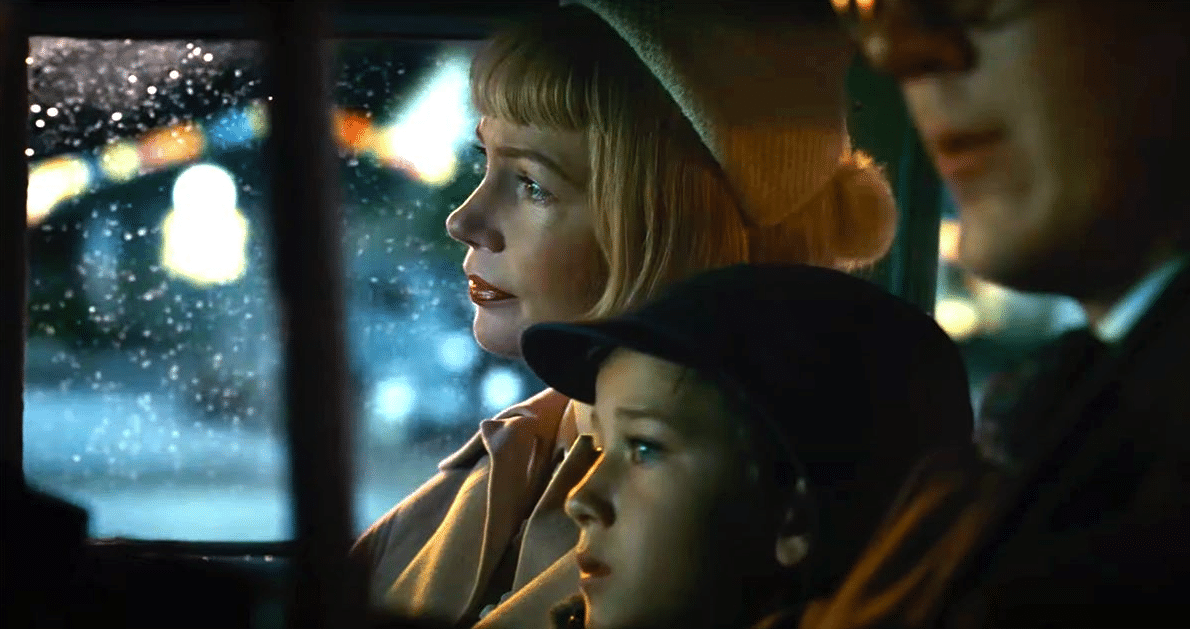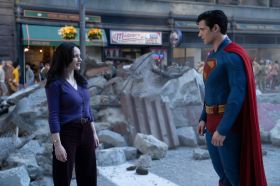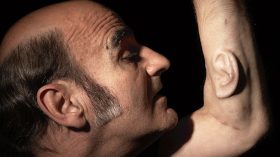What makes a great artist? The Fabelmans isn’t exactly the secret origin of Steven Spielberg, but it does present us with his own fictionalised take on his childhood, his parents’ relationship, and the role that making movies played in making him into … well, Steven Spielberg.
Part birth of an artist, part family drama, it’s a film too big and messy to provide easy answers. Which, when you’re dealing with an artist as talented as Spielberg, turns out to be the only answer that makes sense.
Sammy Fabelman is only eight when his parents Mitzi (Michelle Williams) and Burt (Paul Dano) take him to the movies to see The Greatest Show on Earth. Sammy is an anxious child, and his parents figure a movie about the circus is a safe way to introduce him to the wonders of the big screen.
Not quite: the movie ends with a train going off the rails after hitting a car (filmed using miniatures) that gives Sammy nightmares – and a new obsession, when simply re-enacting the crash with a train set leads to filming the crash himself so he can watch it over and over again. Already he’s coming up with exciting camera angles and narrative twists: Mitzi knows talent when she sees it, and he’s got it.
The Fabelmans move across America’s suburbs throughout the 50s and 60s, as Burt’s genius in the new field of electronic computers sees him headhunted by larger (and located ever closer to California) firms. Mitzi, a former concert pianist, has (mostly) settled into being a housewife, raising the now teen Sammy (Gabriel LaBelle) and his two sisters. And always on the scene is Burt’s best friend Benny (Seth Rogan), who’s the life of the party – or dinner, or camping trip.
Sammy is constantly filming everything, making horror shorts with his sisters, westerns with his friends, and more traditional home movies featuring his family. When his camera captures something about his family dynamic that he’d rather not have seen, his faith in film-making is shattered. But by then it’s too late. Everyone around him knows he has talent, and they don’t want to see it wasted – even if a brief visit by his Uncle Boris (Judd Hirsch), a former lion tamer, has spelt out the high price talent can demand.
Thankfully this largely avoids the usual traps when it comes to biopics of creative types, where the iconic moments they’re known for are clumsily revealed to be nothing more than thinly disguised memoir. There are no close encounters with sharks here, and when Sammy does film an ‘epic’ (for a teenager) war movie, it’s more about how he gets a performance out of his lead than how he gets so many corpses on-camera (they run from one location to another while the camera pans away).
Sammy’s a natural when it comes to creating fiction with a camera; it’s when the camera reveals a truth out of his control that he turns away from destiny. Perhaps it’s to underline this distinction between fiction and reality that this film is split between scenes that simply and efficiently show us what’s going on, and scenes where characters bluntly state what’s happening in a fashion that’d seem clumsy from a less skilled film-maker.
The Fableman’s family dynamic is obvious, yet characters (often the sisters) still spell it out. The sports star of Sammy’s final high school film is clearly shaken by seeing the nerd he bullied turn him into a god on screen … and then he takes Sammy aside to tell him exactly that. At times it feels like a film that simply doesn’t trust the audience to interpret the visuals, even as Sammy’s efforts show us how both film and a film-maker are made.
It’s especially notable because The Fabelmans’ performances are universally spot-on (including a late cameo from David Lynch, the comedy find of 2022). Dano is excellent as the reserved brainiac who’s smart enough to know there’s some things in his marriage he can’t fix no matter how much it kills him. Williams takes a character that could easily have come off as the villain of the story and makes her pain and struggle deeply sympathetic.
She loves her husband but she needs more than he can give (which is to say, she needs to be happy). And if you need an actor to play a funny, charming guy with a heart of gold even when that heart is breaking, Seth Rogan is your man.
A few blunt speeches aside, for a story partly about a disintegrating marriage told from a teenager’s point of view The Fabelmans is remarkably mature (and fault-free) about matters of the heart and human nature. It’s an often-rueful look at a crumbling family, even as it celebrates the joy of making movies; one wouldn’t work half as well without the other.
Technical trickery can delight an audience for a moment, but putting emotions up on screen? That’s the real magic.
The Fabelmans is in cinemas from 5 January.
Actors:
Director:
Format: Movie
Country:
Release:





